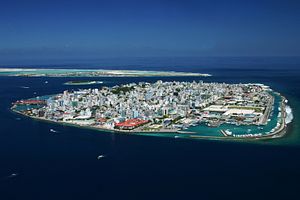Maldivian President Abdulla Yameen has declared a state of emergency in his country ahead of scheduled protests by political opposition groups later this week. Yameen’s decree, citing threats to public safety and national security, will last for 30 days initially and suspend basic rights. Maldivian security forces will act under emergency powers and will be able to preemptively arrest opposition activists and protesters ahead of a major rally against the Yameen government later this week. The move was made on the suggestion of the country’s National Security Council, according to Maldivian Attorney General Mohamed Anil. The move marks another troubling counter-democratic development in the small Indian Ocean island nation.
“President Yameen has declared state of emergency to ensure the safety and security of every citizen,” Muaz Ali, the spokesperson for the presidential office, noted on Twitter. Ali later clarified that the state of emergency will not result in the enforcement of a curfew. The state of emergency is declared under Article 253 of the Maldivian constitution which allows the president to declare a state of emergency “in the event of natural disaster, dangerous epidemic disease, war, threat to national security, or threatened foreign aggression.” The constitution caps any declaration of a state of emergency to a duration of 30 days. The constitution also notes that the president is required to submit a declaration on the state of emergency to the People’s Majlis, the country’s legislature, which can then approve, extend, or revoke the declaration.
In an address on Maldives’ Victory Day, Yameen had left suggestions that his government would declare a state of emergency. “I assure the Maldivian people that the Govt ll take all necessary steps to ensure the safety & security of the people,” he noted. “The most valuable lesson to be learnt as we commemorate our Victory Day was that there were conspirators in our country and abroad, who discreetly and openly desired to destroy the peace and harmony of our country,” the president added. Evidently, the imposition of a state of emergency at this point is, according to the government, designed to ensure security.
Earlier this year, Yameen’s government arrested and imprisoned the country’s first democratically elected president, Mohamed Nasheed, after what amounted to a show-trial in front of a stacked court. Activists affiliated with Nasheed’s party, the Maldivian Democratic Party (MDP), are leading the anti-government rally later this week. Yameen’s declaration also comes at a time when the allegiance of politicians within his own party is under question following an explosion on his personal speedboat, in which he was unharmed, and the discovery of makeshift explosives near his home. His vice president, Ahmed Adeeb, was arrested in connection with the former in late October and denies any involvement.
Hamid Abdul Gaffoor, a spokesperson for the opposition, told the Associated Press that the MDP would meet to decide if the planned anti-Yameen protests will proceed despite the state of emergency. The opposition has condemned the declaration, saying that it was politically motivated.
































